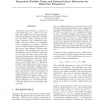Free Online Productivity Tools
i2Speak
i2Symbol
i2OCR
iTex2Img
iWeb2Print
iWeb2Shot
i2Type
iPdf2Split
iPdf2Merge
i2Bopomofo
i2Arabic
i2Style
i2Image
i2PDF
iLatex2Rtf
Sci2ools
132
click to vote
UAI
2004
2004
Dependent Dirichlet Priors and Optimal Linear Estimators for Belief Net Parameters
A Bayesian belief network is a model of a joint distribution over a finite set of variables, with a DAG structure representing immediate dependencies among the variables. For each node, a table of parameters (CPtable) represents local conditional probabilities, with rows indexed by conditioning events (assignments to parents). CP-table rows are usually modeled as independent random vectors, each assigned a Dirichlet prior distribution. The assumption that rows are independent permits a relatively simple analysis but may not reflect actual prior opinion about the parameters. Rows representing similar conditioning events often have similar conditional probabilities. This paper introduces a more flexible family of "dependent Dirichlet" prior distributions, where rows are not necessarily independent. Simple methods are developed to approximate the Bayes estimators of CP-table parameters with optimal linear estimators; i.e., linear combinations of sample proportions and prior mea...
| Added | 31 Oct 2010 |
| Updated | 31 Oct 2010 |
| Type | Conference |
| Year | 2004 |
| Where | UAI |
| Authors | Peter Hooper |
Comments (0)

